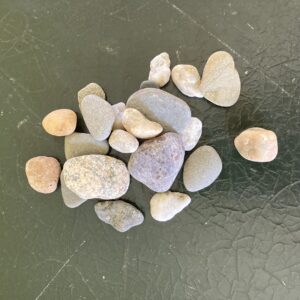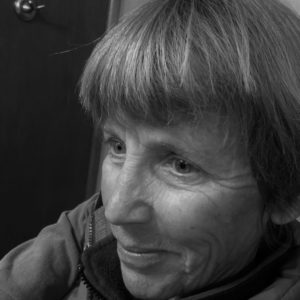 When I was a kid and admittedly a little on the self-centered side, I thought I would someday write an advice column for my hometown newspaper, the New York Times. I decided I would call it Dear Me, ME being my initials. The cleverness of that faded over time, as did the ambition to give anyone anywhere advice. But now I’m back at it, though you won’t find pearls of wisdom here, only a few pebbles I’ve carried in my pocket over the years. Some of them came home with me from the river, others I picked up off the road, and yet others were good luck gifts from people who wished me well. Dear me. Such an abundance.
When I was a kid and admittedly a little on the self-centered side, I thought I would someday write an advice column for my hometown newspaper, the New York Times. I decided I would call it Dear Me, ME being my initials. The cleverness of that faded over time, as did the ambition to give anyone anywhere advice. But now I’m back at it, though you won’t find pearls of wisdom here, only a few pebbles I’ve carried in my pocket over the years. Some of them came home with me from the river, others I picked up off the road, and yet others were good luck gifts from people who wished me well. Dear me. Such an abundance.
I don’t know about you but at this point in time and life I am struggling to balance my naturally inquisitive nature with an underlying need for calm. The more I inquire, it seems, the more unsettled I become. The more I read my hometown newspaper, the more the earth and its people seem doomed. So here are three suggestions about how to wake up to the trials of now and maintain equilibrium and perhaps even do something favorable for the world. If that sounds impossible, it may be. The practice is to give it a try.
1. When it comes to the news of the day, much of it is here for a moment then gone. It’s tempting to focus all our energy and worry on events or people who inspire disturbing emotions, but resist. Don’t dwell. Keep moving. In the words of Zen master Uchiyama Roshi, “Open the hand of thought.”
Open the hand of thought is different than Just relax, which implies an aspiration to an undisturbed life. To open the hand of thought is a form of catch and release, related to fishing, especially fly fishing where you are often standing in the river itself. You are inseparable from the element in which the thoughts or fish arise. If there’s an earthquake in Morocco, a flood in Libya, a kidnapping in Ash Fork and the wheat crop is failing all around the world, be disturbed. But take the next step. I send compassion to each of those events, each of those fish that rise, then I send some comfort to myself and to the big river in which we all swim. I find this helpful.
2. Read fiction, especially books with happy or satisfying endings. Fiction’s job is to create a world, to build a world page after page and to reflect the world in which we live now, have lived in the past, and may live in the future. (Personally, I’d avoid books about the future.) Story is what we inherit and what we create. Happy endings are not a myth, they’re just in short supply sometimes. Or they’re hard to find in all the shouting and waving of doomsday naysayers. Satisfying or happy endings are often the quiet kid in the back of the classroom who’s reading Twenty Thousand Leagues Under The Sea behind a copy of Mrs. Piggle Wiggle.
When my brother was beaten and robbed and landed in the hospital with a ten percent chance to live, I sat beside his bed in the ICU and read Howards End. Through the flashing and beeping of machines, the wheeze of the ventilator, and the cries of other patients and their family members, I sank into the lives of the Schlegels, Wilcoxes and Basts, not to remove myself from all that had happened to my brother, but to better understand what had happened. A great rip had occurred in the fabric of my extraordinarily lucky life. Death had come in close and was sitting at the end of my brother’s hospital bed. E. M. Forster, an articulate man in all matters, had the words to clarify and comfort me. Even the words of the epigraph were comforting: “Only connect….” I found this helpful.
3. History is your informant and friend. Study history and encourage others to do so, especially if they view the current moment differently than you do. Critical thinking, civil discourse and an understanding of history are all in short supply these days. Buyer beware: Some things have happened the way people say they have and other things have not. Information is easily manipulated. Everyone will try and sell you their own brand of the truth. Don’t be afraid to sample them all, but ask the question, “Where did you hear that?” You will discover that the trials of now have also been the trials of then. They are gates we have passed through—not exact replicas but situationally the same. We have navigated the novelties of the wheel, the blade, the cookfire; paper, guns, the internal combustion machine; television and telephones; the World Wide Web and the infancy of AI. Triumphs and trials. Sometimes within our grasp but often controlling us. A familiar relationship. An historical dynamic. To know what has gone before offers perspective. I find this helpful.
The kid who wanted the job as an advice columnist stuck a sign on the bathroom mirror, much to the annoyance of the rest of her family who shared the bathroom. It wasn’t something she herself came up with. It was something thrown out to the general population at that time and she thought it clever and found it useful. It said, from its place on the mirror, “You’re looking at the problem.”
I’m of a different mind today. If I had a sign I would stick it on the door of the cupboard where I keep the tea. That’s a more popular destination than the bathroom mirror. And I’d substitute the word “potential” for “problem,” and make sure the pithy sayings changed every few days to include as much good advice as possible. Today, for example, from a source unknown, comes this: “If we let go of our cherished opinions, the truth will present itself.” I find this hopeful.

